
Faculty to Pursue Collaborations through 2019 Intellectual Community Planning Grants
A key goal of Together Duke is to invest in faculty as scholars and leaders of the university’s intellectual communities. To foster collaboration around new and emerging areas of interest, Intellectual Community Planning Grants (ICPG) are available to groups of faculty.
These grants cover the cost of food, meeting venues, external speakers or other meeting costs, and exploratory research into potential collaborators at Duke and elsewhere. The offices of the Vice Provost for Interdisciplinary Studies and the Executive Vice Provost oversee this seed grant program.
For the 2019 calendar year, eight groups received Intellectual Community Planning Grants ranging from $1,000 to $5,000.
Big Data and Social Interactions

This group will facilitate interactions among faculty who want to learn how technological advancements and big data can improve our understanding of the ways in which social norms and interactions affect individuals’ and firms’ behavior. The primary goal is to produce sustained interactions and research papers capable of being published in leading scholarly journals. A kick-off event will include a visiting speaker. Subsequent meetings will invite faculty to provide overviews of recent research and discuss new ideas; review colleagues’ early-stage research ideas; and share early work with a guest speaker who is a pioneer in the field.
- Lead: Jillian Grennan, Fuqua School of Business
- Chris Bail, Trinity College of Arts & Sciences, Sanford School of Public Policy
- Ines Black, Fuqua School of Business, Duke Innovation & Entrepreneurship Initiative
- Ofer Eldar, Law School, Duke Innovation & Entrepreneurship Initiative
- Sarah Gaither, Trinity College of Arts & Sciences
- Sharique Hasan, Fuqua School of Business, Duke Innovation & Entrepreneurship Initiative
- Rachel Kranton, Trinity College of Arts & Sciences
- David Robinson, Fuqua School of Business, Duke Innovation & Entrepreneurship Initiative
Building Duke’s Community of Theoretical Chemists via a Summer Undergraduate Research Program
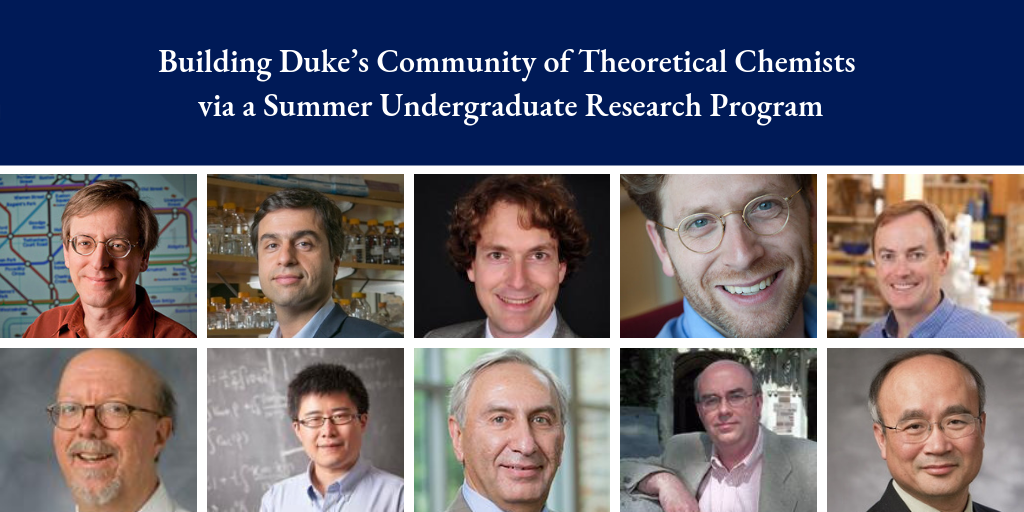
An emerging community of theoretical chemists at Duke is spread across schools and departments. This group has begun to organize a Summer Undergraduate Research Program in Theoretical Chemistry, which will help strengthen the pool of graduate student applicants from North America. The Intellectual Community Planning Grant will enable the participation of more faculty (those who could not fully fund a student on their own) and support team-building excursions. All faculty will present multiple seminars and mentor the summer undergraduate researchers.
- Lead: David Beratan, Trinity College of Arts & Sciences, School of Medicine, Duke University Energy Initiative
- Hashim Al-Hashimi, School of Medicine
- Volker Blum, Pratt School of Engineering, Trinity College of Arts & Sciences, Duke University Energy Initiative
- Patrick Charbonneau, Trinity College of Arts & Sciences
- Stephen Craig, Trinity College of Arts & Sciences, Duke University Energy Initiative
- Bruce Randall Donald, Trinity College of Arts & Sciences, School of Medicine, Pratt School of Engineering, Duke Institute for Brain Sciences, Duke Center for Genomic and Computational Biology
- Jianfeng Lu, Trinity College of Arts & Sciences
- Michael Rubinstein, Pratt School of Engineering, Trinity College of Arts & Sciences
- Warren S. Warren, Trinity College of Arts & Sciences, School of Medicine
- Weitao Yang, Trinity College of Arts & Sciences, Duke University Energy Initiative
Exploring STEAM (Science, Arts, and Humanities) at Duke
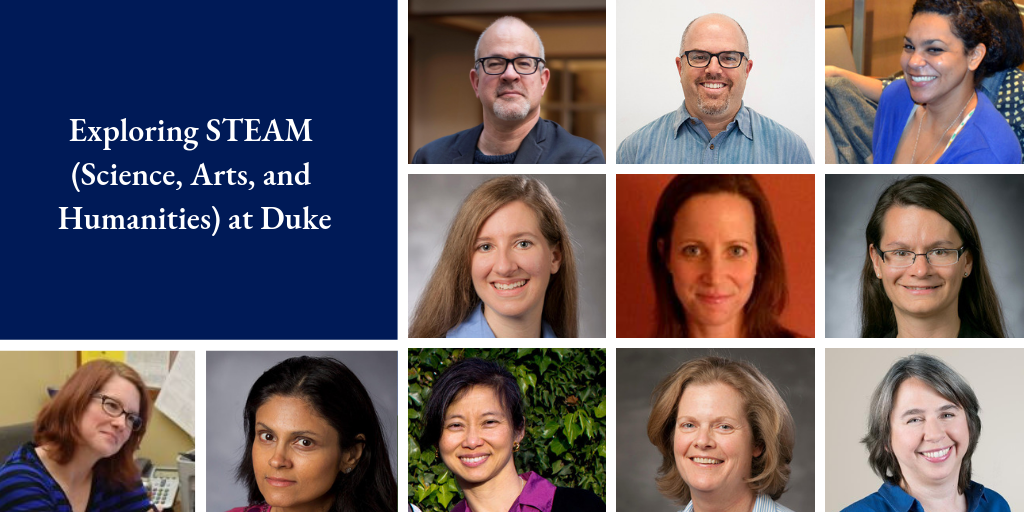
A working group of Duke faculty, staff, administrators, and students will explore overlapping and complementary interests in science, technology, engineering, mathematics, arts, and humanities (broadly referred to as STEAM), and promote more robust interdisciplinary research, coursework, and public engagement in this space, both within and beyond Duke. The group will organize a half-day forum to catalog and describe innovative STEAM activities occurring at Duke and spark new collaborations among faculty, students, staff, and administrators.
- Lead: Misha Angrist, Social Science Research Institute, Duke Initiative for Science & Society, Sanford School of Public Policy
- Co-lead: Jory Weintraub, Duke Initiative for Science & Society
- Project manager: Ariana Eily, Duke Initiative for Science & Society
- Nicolette Cagle, Nicholas School of the Environment
- Aria Chernik, Social Science Research Institute, Duke Innovation & Entrepreneurship Initiative
- Claudia Gunsch, Pratt School of Engineering, Nicholas School of the Environment, Duke University Energy Initiative
- Jules Odendahl-James, Trinity College of Arts & Sciences
- Nimmi Ramanujam, Pratt School of Engineering, School of Medicine, Duke Global Health Institute, Duke Initiative for Science & Society, Duke Innovation & Entrepreneurship Initiative
- Nina Sherwood, Trinity College of Arts & Sciences, School of Medicine, Duke Institute for Brain Sciences, Duke Initiative for Science & Society
- Kearsley Stewart, Duke Global Health Institute, Duke Initiative for Science & Society
- Victoria Szabo, Trinity College of Arts & Sciences, Duke Innovation & Entrepreneurship Initiative
Health as an Ecosystem: Expanding Our Imaginations of Health
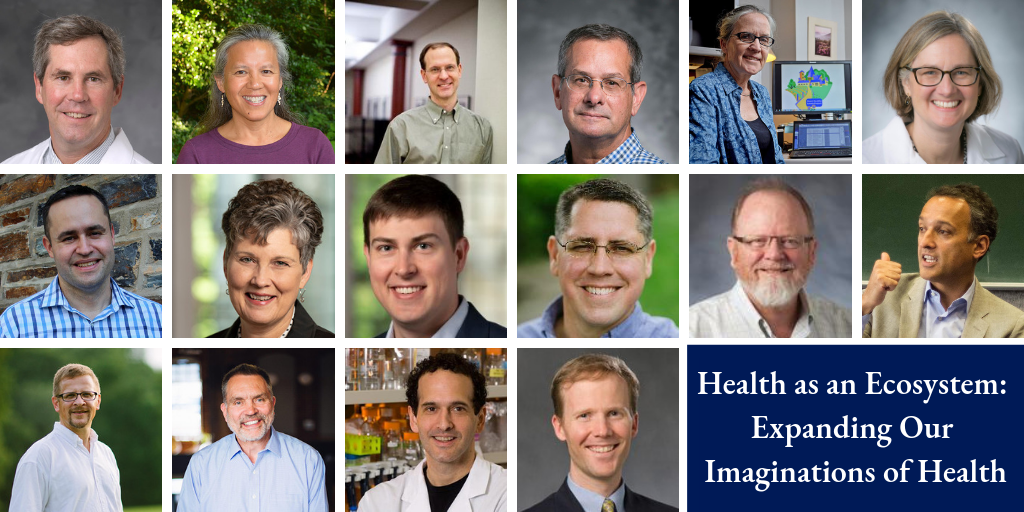
In ecology, an ecosystem is a community of living organisms and their interactions with the abiotic environment. Dynamic and complex, they may flourish in settings of balance, diversity, and responsive resilience, or they may flounder in contexts of deficit and disruption. This group will apply the ecosystem concept to health and explore new perspectives on health systems, population health, well-being, and disease. During monthly meetings, members will consider a range of questions and engage in activities whose focus will encompass capstone projects, seminars, and future grant proposals.
- Lead: John Moses, School of Medicine, Duke Initiative for Science & Society
- Co-lead: Jennifer Lawson, School of Medicine, Duke Initiative for Science & Society
- Charles Nunn, Trinity College of Arts & Sciences
- Richard Di Giulio, Nicholas School of the Environment, Pratt School of Engineering
- Alice Ammerman, University of North Carolina – Chapel Hill
- Eliana Perrin, School of Medicine
- Eric Richardson, Pratt School of Engineering
- Jan Holton, Divinity School
- Brett McCarty, Divinity School
- Bill Walker, Pratt School of Engineering, Duke Innovation & Entrepreneurship Initiative
- Peter English, Trinity College of Arts & Sciences
- Gopal Sreenivasan, Trinity College of Arts & Sciences, School of Medicine, Duke Initiative for Science & Society
- Norman Wirzba, Divinity School, Nicholas School of the Environment
- Jon Fjeld, Fuqua School of Business, Duke Innovation & Entrepreneurship Initiative
- Ray Barfield, School of Medicine, Divinity School, School of Nursing, Duke Initiative for Science & Society
- Warren Kinghorn, School of Medicine, Divinity School, Duke Initiative for Science & Society
Launching a Triangle-Wide Seminar in the Economics of Education
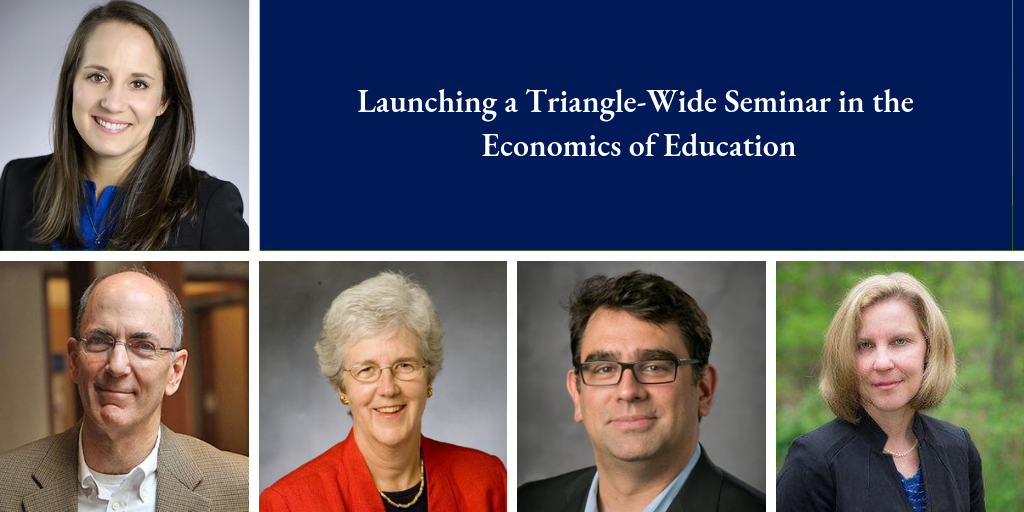
Currently, there is no regular forum for economists from the Triangle to discuss new empirical work on the economics of education. This group will change that by organizing a one-day workshop. Hosted by the Center for Child and Family Policy, the event will include invited presenters, discussants, and a keynote speaker. It will also serve as a means to explore the possibility of launching a year-long seminar series in 2019-2020 on the economics of education.
- Lead: Sarah Komisarow, Sanford School of Public Policy
- Charles Clotfelter, Sanford School of Public Policy, Trinity College of Arts & Sciences
- Helen Ladd, Sanford School of Public Policy, Trinity College of Arts & Sciences
- Marcos Rangel, Sanford School of Public Policy
- Beth Gifford, Sanford School of Public Policy, School of Medicine
Marine Medicine: Multidisciplinary Research at the Nexus of the Environment and Human Health
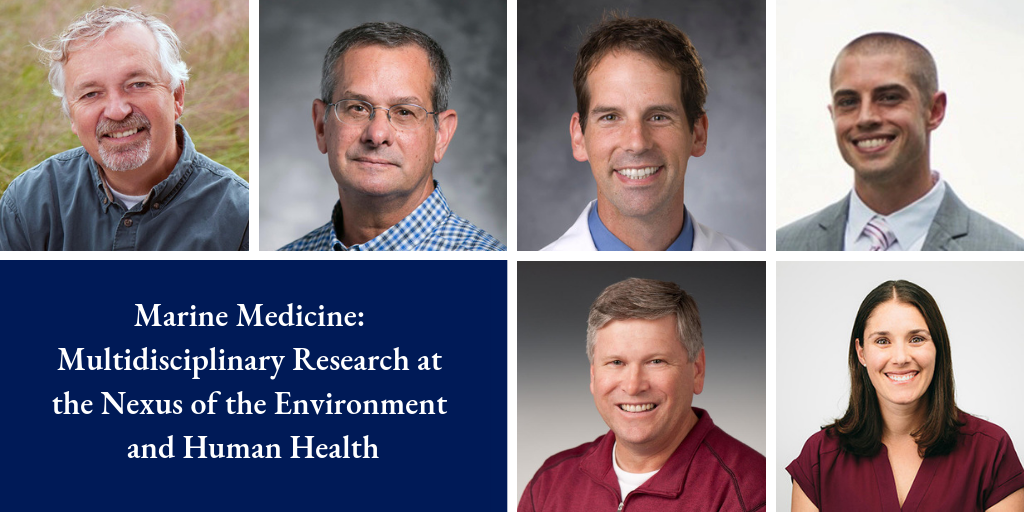
Marine medicine is focused on research that cuts across disciplines, including cross-species comparative analyses of cancer protective mechanisms, understanding the risk of disease from exposure to environmental toxins, and discovery of new drugs from marine compounds. This working group will convene monthly and invite guest speakers to provide critical feedback on papers and proposals. Members will also host an annual symposium with a keynote speaker and a networking event to establish collaborations between faculty across the School of Medicine and the Nicholas School of the Environment, and create a long-term strategy for sustained interactions.
- Lead: Andrew Read, Nicholas School of the Environment
- Richard Di Giulio, Nicholas School of the Environment, Pratt School of Engineering
- Will Eward, School of Medicine
- Jason Somarelli, School of Medicine
- Tom Schultz, Nicholas School of the Environment
- Meagan Dunphy-Daly, Nicholas School of the Environment
Parasite-Host Evolution Network Optimization (PHENO) Working Group
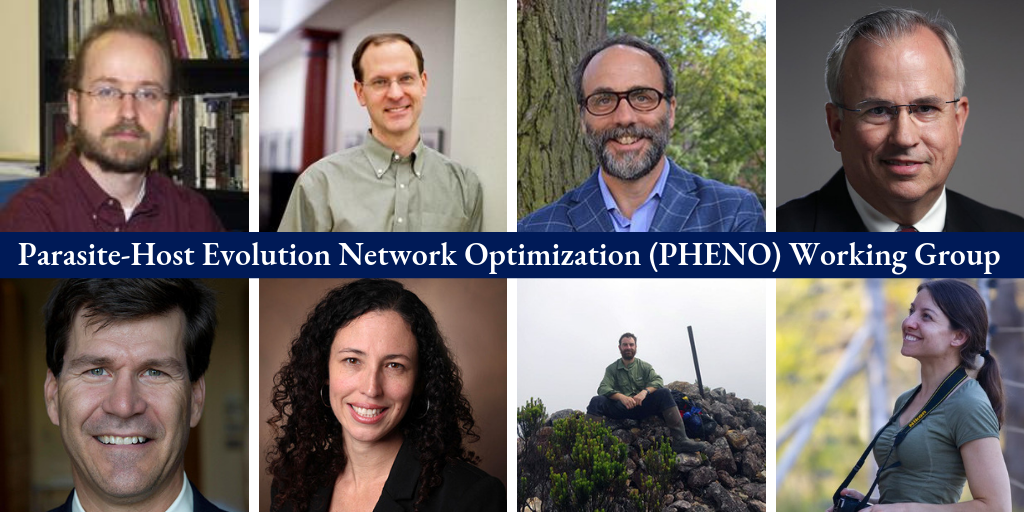
Better methods are needed to identify new pathogens or known animal pathogens with the potential to infect humans and cause disease. Given that pathogens transmit through chains of contact, network-based approaches that represent these epidemiological pathways offer great promise. Through regular meetings, this group of faculty and postdocs will investigate the application of network approaches to a wide range of disease systems and aim to develop new and fundable research projects.
- Lead: James Moody, Trinity College of Arts & Sciences, Social Science Research Institute
- Charles Nunn, Trinity College of Arts & Sciences
- Craig Rawlings, Trinity College of Arts & Sciences
- Gregory Gray, School of Medicine, Duke Global Health Institute
- Chris Woods, School of Medicine, Duke Global Health Institute
- Meira Epplein, School of Medicine
- James Herrera, Trinity College of Arts & Sciences
- Dana Pasquale, Duke Network Analysis Center
Social Studies of Science Working Group
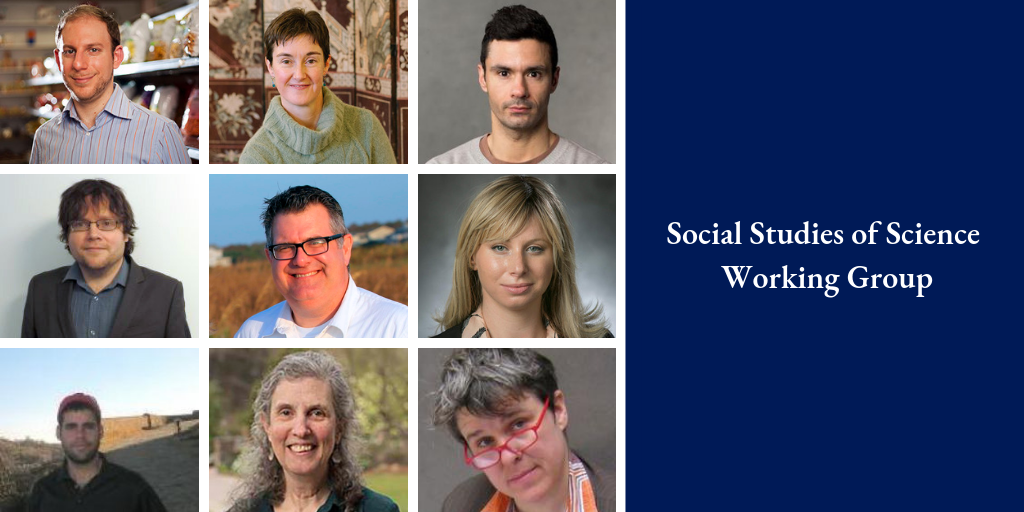
The social study of science, often referred to as science and technology studies, is an interdisciplinary field whose scholars explore topics ranging from the ethical implications of data hacking and the politics of nuclear power to questions of personhood emerging from neuroscience. This group will bring together faculty who are interested in the rapid scale-up of research in the biomedical sciences, data and computational sciences, and environmental sciences as well as the increasing overlap of science and technology studies, medical humanities, and environmental humanities. Members aim to build a network of Duke and Triangle faculty and foster linked research endeavors.
- Lead: Harris Solomon, Trinity College of Arts & Sciences, Duke Global Health Institute, Duke Initiative for Science & Society
- Nicole Barnes, Trinity College of Arts & Sciences, Duke Global Health Institute
- Nima Bassiri, Trinity College of Arts & Sciences
- Paul Bendich, Trinity College of Arts & Sciences, Rhodes Information Initiative at Duke
- Mark Olson, Trinity College of Arts & Sciences, Duke Initiative for Science & Society, Duke Innovation & Entrepreneurship Initiative
- Cate Reilly, Trinity College of Arts & Sciences
- Gabriel Rosenberg, Trinity College of Arts & Sciences
- Priscilla Wald, Trinity College of Arts & Sciences, Duke Initiative for Science & Society
- Ara Wilson, Trinity College of Arts & Sciences, Duke Initiative for Science & Society
- Read about the 2018 recipients of Intellectual Community Planning Grants and view the 2017 summary report.
- See all current initiatives in the Together Duke academic strategic plan.
- Access the RFP for Research Collaboratories in Energy and Water Resources; Race, Religion, and Citizenship; and Population Health (due February 15).